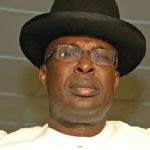Former Vice President, Atiku Abubakar has declared that State capture poses a significant barrier to achieving meaningful democratic change, stressing that there was no doubt whatsoever that our democratic is at a crossroads.
This was as he called for radical judicial reform to curb judicial recklessness, saying that in a period of less than 20 years, the Nigerian judiciary has moved from being the beacon of democratic sustenance to becoming, arguably, the biggest threat to Nigeria’s democracy, stressing that the ugly trend must change.
He particularly said that the same judiciary that affirmed the primacy of parties in choosing their candidates and leaders now sanction and indeed promote destruction of parties by a few, and in some cases, a single individual with a personal agenda.
The presidential candidate of the Peoples Democratic Party (PDP) in the 2023 election, also expressed concern over the declining consistency in governance and the erosion of people’s freedom to choose their leaders, adding that nostalgic references to the developmental achievements of the First Republic, in comparison to later periods, highlight this decline.
Atiku, who was also the presidential candidate of the Peoples Democratic Party (PDP) in the 2023 election, noted that Nigeria’s democracy is at a critical juncture, thus stressed the urgent need for coalition-building and a potential merger to displace the ruling All Progressives Congress from power.
Speaking as a panellist in Abuja at the National Conference on Strengthening Democracy in Nigeria on Monday, January 27, 2025, said that Nigeria’s democracy is at the risk of being eroded completely.
In the words of Atiku; “And it is not caused by one single person or one single administration. In fact, a number of us have been warning over the years that we may come to this pass if we lose our vigilance and fail to take corrective actions to protect and deepen our democracy.
“At the risk of sounding modest, I doubt that there are many contemporary senior political leaders who have spoken out and done more to promote democratic governance in our country than me.
“In addition to public statements and presentations, I brought some actions to our courts which produced landmark judicial decisions intended to uphold democratic principles and practices.
“Some of that effort was thrust upon me by circumstances of political struggles. But much of my effort was because of two things: my participation among other leaders in the struggles to ease the military out of power; and my deep and enduring belief that democracy is the best route to development and unity for our diverse country and peoples.
“Democracy is characterised by, among other things, people’s freedom to choose their leaders; periodic elections, which partly ensure leaders’ commitment to the welfare of the governed, leaders’ acceptance of guardrails (without restraints, leaders tend to accumulate and abuse power); consequences for non-compliance, including rejection at the polls.
“An independent judiciary to adjudicate disputes, and in a presidential system, checks and balances among the three branches of government,” he said.
Atiku specifically said that the deterioration in people’s freedom to choose their leaders, has led to what many now regard as state capture in the country.
He further said; “The gravest consequence of which is the increasing difficulty in removing those in power through democratic means.
The former Vice President canvassed the institutional capacity of political parties, the normative acceptance by party members, consequences for non-compliance, stressing that judicial reforms must be urgently addressed.
Atiku noted that democracy cannot be sustained without strong political parties, particularly opposition parties, saying that ownership of parties by or their subordination to individual big men is the antithesis of democracy.
According to Atiku; “Party supremacy is critical, but party supremacy cannot be achieved through the current funding model for our parties. Funding by governors and a few wealthy individuals is not a democratic model.
“As we know, he who pays the piper dictates the tune. Funding must be democratised. Members must invest in and co-own parties.
“Normative acceptance (compliance by members, especially leaders) of party rules and the country’s laws. Laws that are not obeyed cannot effectively influence people’s behaviour. Party members, especially leaders, must subject themselves to party supremacy and the rules of the game.
“Democratising funding will help to get leaders to abide by the rules. And so will there will be consequences for non-compliance. It must be made costly to ignore party supremacy/rules.
“Elected members decamping must vacate their seats. That should not be open for discussion/debate when it happens. And, more broadly, electoral malpractice generally must be punished rather than rewarded. These are necessary for political integrity.
“Coalition-Building. In addition, opposition parties must realize that it is extremely difficult to dislodge a governing party, however unpopular it may be and however fed up the people may be with it. Coalition-building and outright mergers are critical for building the capacity of the opposition to achieve that goal. Our own history and examples from other countries prove that.
Atiku stressed that the judiciary’s role in electoral disputes is meant to uphold the will of the voters, adding however, that the judiciary, even at the highest levels, often manipulates technicalities to deny voters their preferred choices instead of confirming them.










